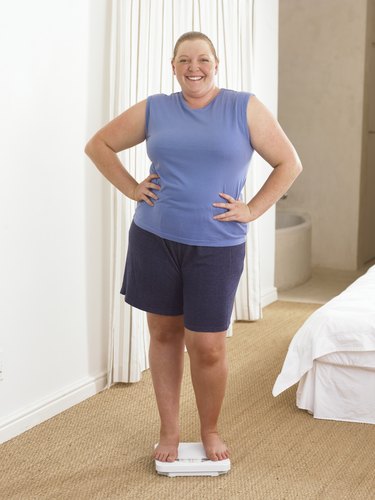
If you're overweight at 191 pounds, weight loss can not only make you look better, but it can also improve your health. Being overweight heightens your risk of various health conditions including sleep apnea, stroke, heart disease, certain types of cancer and high blood pressure. Whether you need to lose 5 pounds or 50 pounds, the way to go about it remains the same -- you must burn more calories than your body uses every day.
Aim for Gradual Weight Loss
Video of the Day
Although fast weight loss might be tempting, it's not recommended. According to the Centers for Disease Control and Prevention gradual weight loss at a rate of 1 to 2 pounds per week is easier to maintain in the long run. It also allows you to slowly get used to the lifestyle changes you're making to lose weight. Since there are 3,500 calories in 1 pound of fat, you must accumulate a daily deficit of 500 to 1,000 calories through exercise and diet to achieve this.
Video of the Day
Incorporate Dietary Changes
Making healthy dietary changes can contribute to your daily caloric deficit. The National Heart, Lung, and Blood Institute recommends consumption of a diet consisting of a variety of fruits, veggies, and whole grains, such as brown rice and whole-wheat pasta. Lean meats, beans, skinless poultry, and reduced-fat dairy products are also recommended. Reduce your portions to lose weight. Limit sugar as well as saturated and trans fats, which are present in many baked and fried foods, fatty meats, hard margarine, lard and full-fat dairy products.
Burn Calories with Aerobic Exercise
Aerobic exercise, or cardio, burns calories that contribute to your daily caloric deficit. The American College of Sports Medicine states that doing between 150 and 250 minutes of moderate cardio a week can trigger weight loss. In 30 minutes, a 191-pound person can burn 219 calories by walking briskly at a speed of 3.5 mph; 462 calories by climbing stairs or bicycling at a speed of 12 to 13 mph; and 404 calories during a casual game of racquetball.
Build Muscles with Resistance Training
Resistance training promotes weight loss because it preserves and increases muscle tissue, which uses up a lot of calories to sustain itself. The University of Rochester Medical Center recommends resistance training on two to three days of the week. They suggest working your large muscle groups and continuously increasing the resistance so it's hard to do another repetition with perfect form after finishing a set. Exercises can include pushups, bench presses, lat pull-downs, crunches, squats, dead lifts and lunges. Always warm up with five to 10 minutes of light cardio before starting your workouts. If you're new to exercise or have an injury or health condition, get your doctor's consent before engaging in any physical activity.
- National Heart, Lung, and Blood Institute: What are the Health Risks of Overweight and Obesity?
- Centers for Disease Control and Prevention: Losing Weight
- National Heart, Lung, and Blood Institute: How are Overweight and Obesity Treated?
- American College of Sports Medicine: ACSM Position Stand on Physical Activity and Weight Loss Now Available
- American Council on Exercise: Calculate Your Calories Burned
- University of Rochester Medical Center: Lifting Your Way to Weight Loss